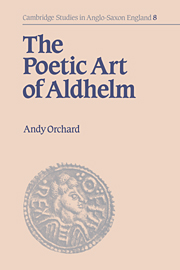Book contents
- Frontmatter
- Contents
- List of tables
- Preface
- List of short titles and abbreviations
- Sigla of scholars cited
- 1 Aldhelm's life and verse
- 2 Aldhelm and the Anglo-Latin octosyllable
- 3 Aldhelm's hexameter verse style and its origins
- 4 Aldhelm's remembered reading in verse
- Appendix 4.1 Parallel diction in Aldhelm's sources
- 5 After Aldhelm: the Anglo-Latin legacy
- Appendix 5.1 Parallel diction in Aldhelm's Anglo-Latin heirs
- Appendix 5.2 A statistical survey of Anglo-Latin verse
- Bibliography
- Index
5 - After Aldhelm: the Anglo-Latin legacy
Published online by Cambridge University Press: 23 November 2009
- Frontmatter
- Contents
- List of tables
- Preface
- List of short titles and abbreviations
- Sigla of scholars cited
- 1 Aldhelm's life and verse
- 2 Aldhelm and the Anglo-Latin octosyllable
- 3 Aldhelm's hexameter verse style and its origins
- 4 Aldhelm's remembered reading in verse
- Appendix 4.1 Parallel diction in Aldhelm's sources
- 5 After Aldhelm: the Anglo-Latin legacy
- Appendix 5.1 Parallel diction in Aldhelm's Anglo-Latin heirs
- Appendix 5.2 A statistical survey of Anglo-Latin verse
- Bibliography
- Index
Summary
The extent of the influence of Aldhelm's Latin verse in later Anglo-Saxon England can to some degree be measured by the large number of surviving manuscripts from the period. Of twenty-one English manuscripts containing Aldhelm's works, five contain the Carmen de virginitate and four the Entgmata; all manuscript evidence for the collection of the Carmtna ecclesiastica is continental. Extensive glossing in a number of these manuscripts points to detailed study of Aldhelm's verse, particularly in the later period, and these indications are fully borne out by imitation of Aldhelm's poetry in the verses of subsequent Anglo-Latin authors.
It is a mark of the immediate popularity of Aldhelm's verse that practically every Anglo-Latin hexameter composition penned within a century of his death is heavy with his influence; indeed much extant Latin metrical verse from Anglo-Saxon England written before the tenth century is little more than Aldhelmian pastiche. It is important to examine a number of examples of such verse, since although Aldhelm's influence has generally been recognized, the extent of the debt has in every case been underestimated. Close examination of the ways in which later Anglo-Latin poets recast Aldhelm's verse is also of use in establishing how much their metrical techniques differ from their model.
Aldhelm's poetry was popular even within his own lifetime. We have already seen how Æthilwald imitated Aldhelm's Carmen rhythmkum in his own octosyllables, and it will be recalled that among the three poems sent to the master for correction was a hexameter composition, similarly derivative, one might assume, and now lost.
- Type
- Chapter
- Information
- The Poetic Art of Aldhelm , pp. 239 - 283Publisher: Cambridge University PressPrint publication year: 1994



